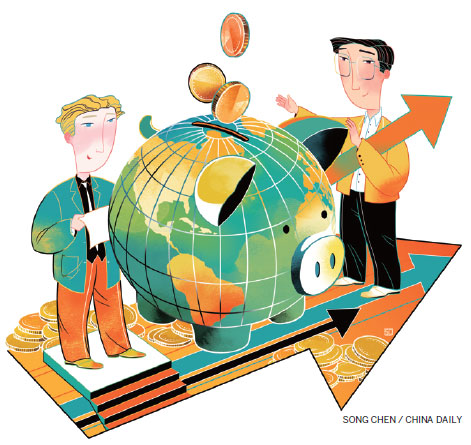Moment of consequence
Strengthening its board of directors would enable the World Bank to deal with the new wave of development challenges, no matter who is at the helm as president
China, a major World Bank client since its first loan was approved in 1981, should have a keen interest in the future direction of the largest multilateral development bank. The imminent change at the helm is an opportunity for the World Bank to go beyond fighting poverty, and give top priority to confronting the dangers of climate change, widening income gaps and the hindrances to open world trade - crucial concerns in China, and Asia.
But getting this agenda off the ground could be stymied if the US administration's nominee for the presidency, David Malpass, is put there mainly to slow climate action and check the rise of China.
Malpass, an undersecretary of the US Treasury, is the lone candidate for the vacant position and reinforces the unwritten norm of an American national always heading the World Bank. This manner of selecting the chief of the multilateral agency - and a European leading the International Monetary Fund - is highly problematic. But, be that as it may, the big question is what direction the Bank will take going forward.

How the World Bank handles this moment of change will have major consequences. After all consider the dominant size of its lending: $67 billion in 2018, which is several folds larger than the annual lending of the relatively new China-based agencies, the Asian Infrastructure Investment Bank and BRICS New Development Bank.
As of mid-2018, China received from the World Bank cumulative financing of $60.5 billion (excluding that from its private sector arm, the International Finance Corporation). This financing went to 416 projects in a range of sectors including transportation, the environment, urban development, rural development, energy, water and human development.
Independent evaluations point to the successes and failures of the World Bank. Over the past 25 years, extreme poverty has fallen by well over half, with East Asia and especially China leading the reduction.
The World Bank's support for trade and market reforms can take some of the credit for growth and poverty reduction. But it should also take some of the blame for the costly neglect of the environment and climate change that accompanied the charge for growth, especially in East Asia and China.
A concern about Malpass, who has been a skeptic of climate actions, is that he may not drive the bank's plan to lend $200 billion over the next five years to fight climate change.
The development agenda for a global bank is best guided by John Maynard Keynes' idea that the role of government is not to do what the private sector does regardless of whether it does it a little better or a little worse, but to do those things that are not being done at all. In that spirit, the agenda is best focused on global "public" problems such as damage to the environment, deficiencies in basic health and education, and gaps in infrastructure, where the private sector vastly under invests. The World Bank has a vital role in these causes - provided its support is efficient and effective.
But to stay relevant, the World Bank needs to blend financing with its expertise in problems of rapid urbanization, alarming demographic shifts, rising income disparities and climate change. Improving governance and tackling corruption are guaranteed silver bullets for progress in these areas. The World Bank's experience in policy dialogue with governments, and its ability to provide solutions, means it can make a difference.
Taking this direction will help the World Bank to have a truly global clientele, including China, which is set to reach high-income status. As reflected by independent ratings of China projects, its use of World Bank financing is among the most effective. But the nomination of Malpass, a critic of World Bank lending to China, seems to be a part of the administration's move to contain the country's presence. There is an argument, however, for keeping higher income countries, who under current policies "graduate" from the institution as they reach high-income status. Their presence can add value, not necessarily for borrowing money, but for their role in sharing lessons learned along the development path.
There is a way to enable the World Bank to deal with the new wave of development challenges, regardless of who is at the helm as president. And that is by strengthening its board of directors with highly regarded development leaders from the member countries who can provide checks and balances to the presidency because of the intellectual and political weight they carry.
If the US administration's choice is not to result in the World Bank primarily serving US interests, its independence needs to be vastly strengthened. The board, comprising 25 directors, has increasingly been made up of bureaucrats from member countries. As a counterbalance to the president who chairs the board, there needs to be a strong board giving strong and cohesive leadership for the World Bank's program.
The World Bank is a highly proficient organization staffed with deep skills in multiple disciplines in development. But for its interventions to be effective, the World Bank must refocus attention on the critical global public problems, blend its offering of financing with knowledge, and broaden its country coverage as a truly global development institution.
The author is a professor at the Asian Institute of Management and National University of Singapore. As a former senior vice-president at the World Bank, he is the author of Multilateral Banks and the Development Process. The author contributed this article to China Watch, a think tank powered by China Daily. The views do not necessarily reflect those of China Daily.
(China Daily 03/27/2019 page13)


















